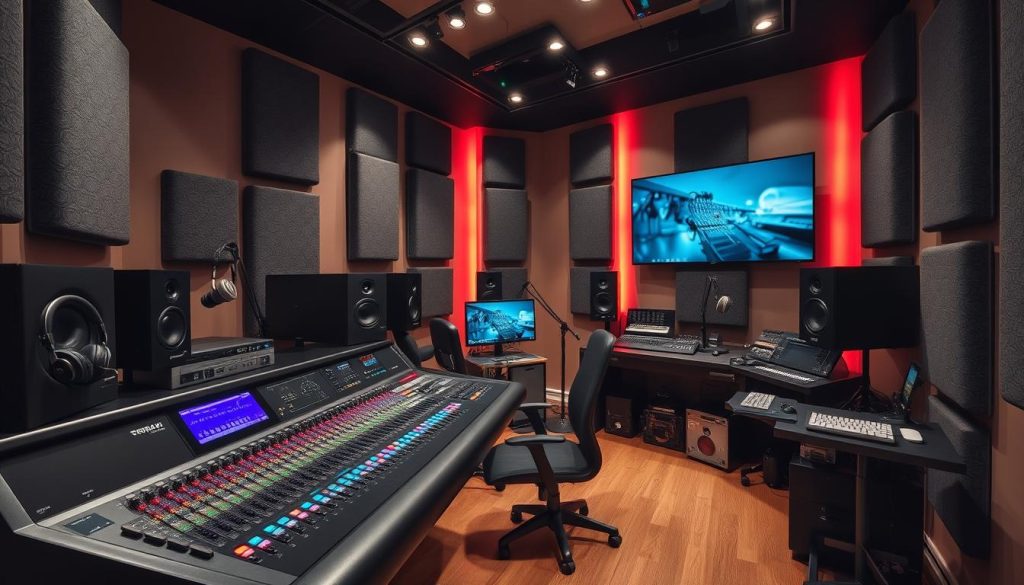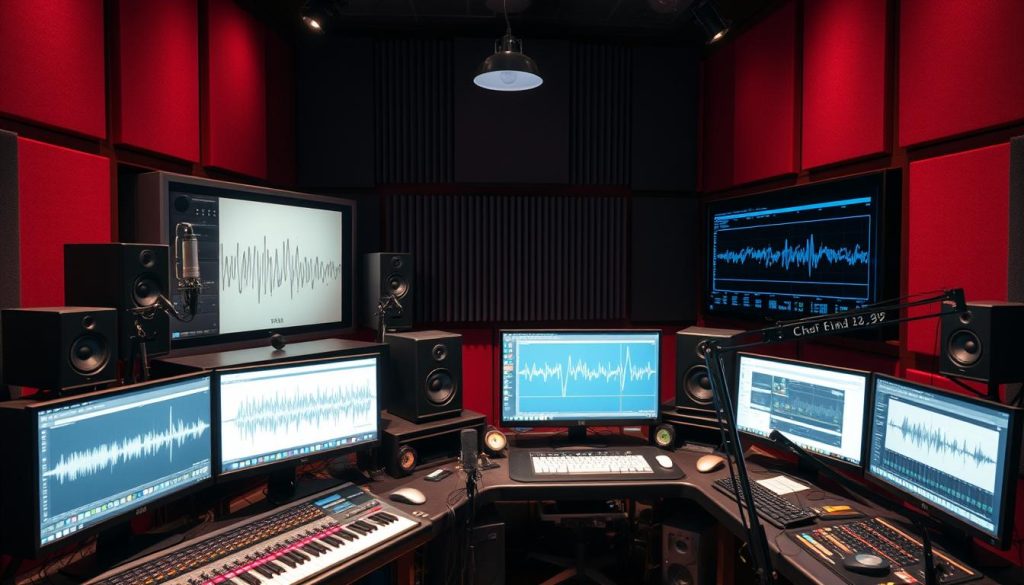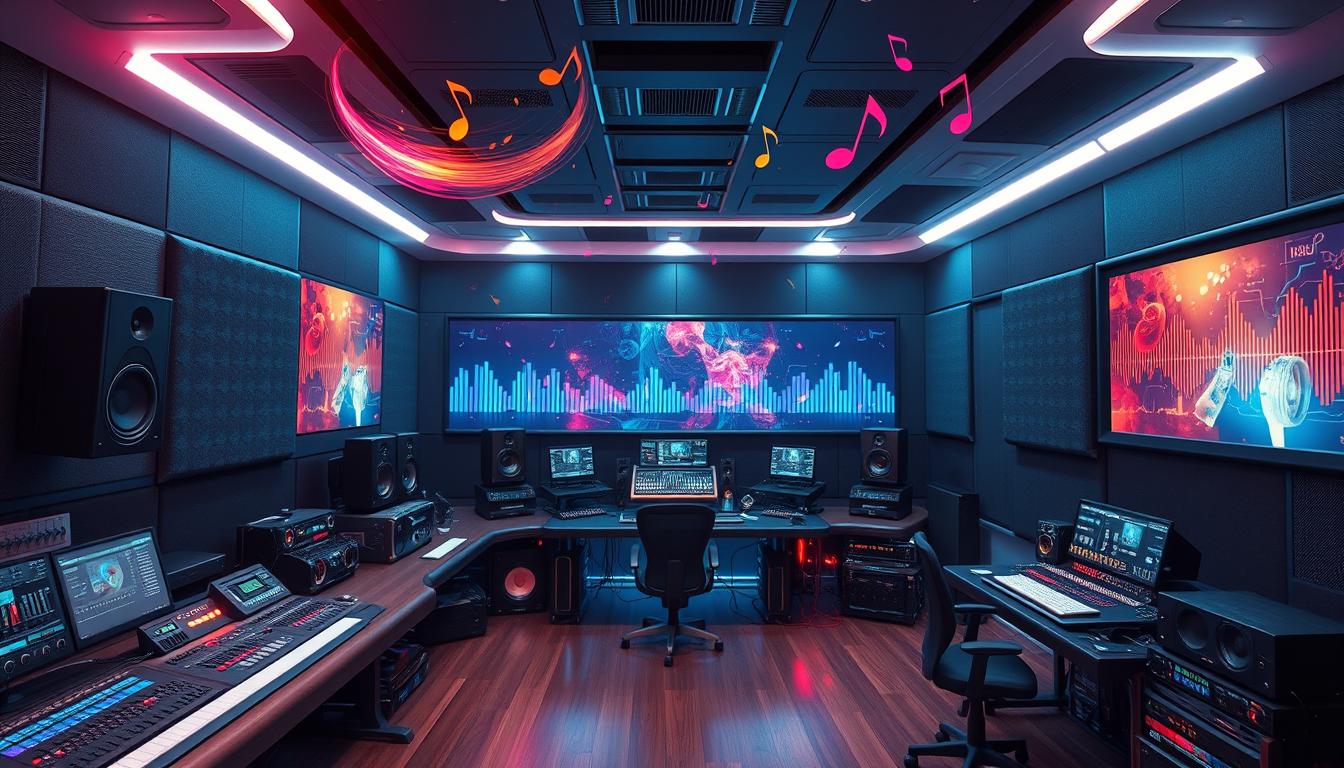I love being an audio engineer. Mastering makes a recording go from good to great. It makes sure the sound is balanced and powerful.
As a mastering engineer, I listen and adjust the sound. I use tools like compression and equalization. My goal is to make the music sound great on any device.
Working in audio engineering lets me make music come alive. I’m proud to be the last step before an album is released. I make sure the music touches listeners deeply.
The Importance of Audio Engineering in Music Production
Audio engineering is key in music production. It makes sure the sound is top-notch, levels are right, and adds depth to songs. As an audio engineer, I know how vital we are in making music sound great for fans everywhere.
Enhancing Sound Quality
Audio engineers use special techniques like compression and equalization to make music sound better. We make sure every instrument and voice is clear and balanced. This makes the music sound full and powerful.
Balancing Levels and Frequencies
It’s our job to make sure all parts of a song work well together. We adjust levels and frequencies to avoid any one sound getting too loud. With multitrack recording and panning, we make music sound clear and immersive.
Working with artists and producers, audio engineers are key to making music come alive. We improve sound quality, balance levels, and add depth. This makes sure the music captures the artist’s true sound.
The Role of Mixing and Mastering Engineers

In music production, two key people are important: the mixing engineer and the mastering engineer. They make sure the music sounds great before it goes out. They help make the music sound its best.
Mixing Engineer
The mixing engineer mixes different tracks together. They adjust levels, where sounds sit in the mix, and add effects. Their job is to make each sound clear and deep, while keeping the mix sounding professional.
Mastering Engineer
The mastering engineer does the final touches. They use special techniques to make the music sound perfect. This includes making the sound good for different speakers and albums. They make the music ready for listening on any device.
Together, these engineers make music sound amazing. They make sure listeners get a great sound experience.
| Mixing Engineer | Mastering Engineer |
|---|---|
| Responsible for blending individual audio tracks | Responsible for fine-tuning the final mix |
| Adjusts levels, panning, and applies audio effects | Employs EQ, compression, limiting, and stereo enhancement |
| Creates a well-balanced and harmonious soundscape | Optimizes the track for various playback systems |
| Enhances the clarity and depth of each instrument | Ensures consistency across the album or compilation |
Mastering: The Final Step in Audio Engineering

Audio mastering is the last step in making music. It adds the final touches to make the sound professional. As a musician, I know mastering is key to improving my tracks’ quality. It gets them ready for sharing on different platforms.
The mastering engineer works on the final mix. They make sure the sound is balanced and ready for the radio. They use techniques like EQ, compression, and stereo enhancement to boost the sound quality.
Mastering is vital for turning raw recordings into professional tracks. It’s the last step before releasing the music. Without it, even great mixes might not sound their best.
For music producers, audio engineers, or music lovers, knowing about mastering is important. It’s what makes the final product shine. Mastering is the last step that brings everything together.
Impact of Audio Engineering on Different Music Genres
As an audio engineer, I’ve learned how our work shapes different music sounds. From EDM’s beats to hip-hop and R&B’s soulful tunes, our impact is clear.
Electronic Dance Music (EDM)
EDM relies heavily on audio engineering for its immersive sound. Engineers work on making the low-end bass strong and the synth melodies clear. They also make sure the sound spreads wide, perfect for the dance floor.
Hip-Hop and R&B
Hip-hop and R&B need a special touch from audio engineers. They focus on making vocals clear and beats groovy. Engineers balance the sound to make the music feel complete and catchy.
| Music Genre | Audio Engineering Focus | Key Techniques |
|---|---|---|
| Electronic Dance Music (EDM) | Powerful, immersive soundscapes | Bassline shaping, synth manipulation, wide soundstage |
| Hip-Hop and R&B | Vocal clarity, groove-driven beats, balanced instrumentation | Vocal processing, rhythmic element balancing, sampling |
Audio engineers use special skills for each music type. They make EDM’s bass loud and R&B’s vocals smooth. Their work shapes music across the board.
Audio Engineering: Bringing Music to Life
As an audio engineer, I love how crucial our role is in music production. We take raw sounds and make them shine. Our skills mix technical know-how with artistic feeling. This way, we make sure the sound is perfect, balanced, and full.
I aim to make music that touches the audience and shows the artist’s true vision. I use special techniques and work with musicians and producers. My goal is to make a sound that stands out and moves people.
Audio engineering is key in making music come alive. It’s not just about the music itself but how we shape it. With the right use of technology and musical skills, we turn a simple performance into something amazing. This makes the music move and touch people deeply.

